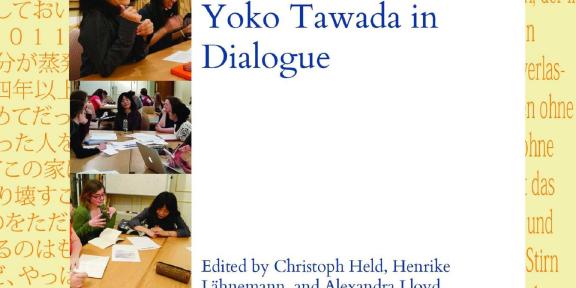The German Sub-Faculty is pleased to launch the second booklet in the Treasures of the Taylorian Series ‘Writers in Residence’. It came out of the collaboration with the writer in 2017. brings together contributions by Emma Huber, Christoph Held, Henrike Lähnemann, Sheela Mahadevan , Alexandra Lloyd and Rey Conquer. Christoph Held writes: “The works of the Japanese writer Yoko Tawada, who lives in Germany and writes in both German and Japanese, demand the suspension of common concepts of reading, understanding, and thinking. Her translingual writing is based on a playful and, at the same time, critical handling of language and various processes of trans¬lation: from one language into another, from thoughts into text or sounds, from sounds into text and vice versa. In many of her texts, the linguistic material is taken apart, alienated, and recomposed, in order to achieve new modes of expression, and raise its poetic potential. Through such a deconstructive and productive trans¬formation, her language consistently eludes conventional principles of meaning and its attribution, and thereby opens up a space for criticism and creativity where national and mono-cultural patterns of language, thinking, and identity can be challenged. Given the current transnationalisation of all spheres of life on the one hand, and an alarming worldwide return to concepts of nation-hood and cultural borders on the other, the discussion and stimu¬la-tion of this creative multilingualism can play a key role in social and educational contexts. The fact that the development of its potential for new creative ways of building identities and pluralising values is primarily taking place on an aesthetic-linguistic, i.e. literary, level is also significant in times when academic fields such as Modern Languages and Literary Studies have come under pressure to justify their work. The engagement with transcultural and translingual literature, such as that of Tawada, in the context of higher education enables students to discover, develop and use the social, political, and didactic potential of their own multilingualism as a powerful source of creativity, criticism, and emancipated conceptions of identity. In 2017, we invited Tawada to the University of Oxford and organised a series of events, in which students were given an invaluable opportunity to discuss with her issues of translation between cultures and differing language systems as well as questions of multilingualism and identity that are central to many of her texts. When we prepared the programme, it was our ambition to give it a transdisciplinary focus that would do justice to the transcultural and multilingual nature of her works. This ambition is reflected in the contents of this book which is the result of some of the events during Tawada’s visit, and combines contributions from students of Modern Languages, Oriental Studies, and English. The project was made possible by the superb German Academic Ex¬change Service (DAAD) Writer-in-Residence Programme which gives universities in the UK and Ireland the opportunity to invite writers from Germany and involve them in seminars, work¬shops, and readings. Alongside the DAAD, we would particularly like to thank the Faculty of Medieval and Modern Languages, the Taylor Institution Library, and St Edmund Hall for their generous support.
